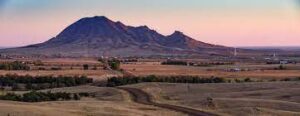It’s the biggest bill aimed at helping at-risk wildlife in 50 years – and it’s bipartisan. South Dakota would benefit if it passed
It’s the biggest bill aimed at helping at-risk wildlife in 50 years – and it’s bipartisan. South Dakota would benefit if it passed
By Chris Hesla
The alarm bell is sounding for America’s wildlife. One example is the monarch butterfly. When I was a kid, they were all over our backyards, prairies, and farm fields. But now monarchs have declined to the point where a sighting of them has become a novel thing.
America’s wildlife crisis is real. Throughout the country, studies show that more than one third of America’s wildlife are edging towards extinction. But the good news is that Congress is in a position to pass a bold, bipartisan solution as big as the problems species face.
The Recovering America’s Wildlife Act (RAWA), which has passed both a Senate and House committee with strong bipartisan support, would dedicate $1.4 billion toward locally-led efforts to help fish and wildlife species in decline. It has 32 cosponsors in the Senate — 16 of them Republicans — and more than 170 cosponsors in the House.
RAWA would send more than sixteen and a half million dollars annually to the South Dakota Game, Fish and Parks Department, which would use the money to help nearly 104 wildlife species identified as needing conservation assistance, including peregrine falcons, river otters, and greater prairie chickens. The bill will also provide funding to South Dakota’s federally-recognized Tribes so that they could do more work to bolster at risk wildlife species on their lands.
RAWA should appeal to Senator Thune, Senator Rounds. First and foremost, the bill would do wonders to prevent the decline of at-risk fish and wildlife species. That means more butterflies in our farm fields, more songbirds on our prairies, more otters in our rivers, more peregrine falcons in our skies, and so on. That in of itself is a fantastic thing.
But the benefits of this bill wouldn’t end there. Ranchers and farmers would benefit too. In order to bolster species in need of conservation assistance, the South Dakota Game, Fish and Parks Department would invest in voluntary habitat projects undertaken on private lands by interested farmers and ranchers. This would provide cash in the hand for producers. In addition, by increasing the populations of at-risk species, RAWA would prevent some from becoming listed under the federal Endangered Species Act, thereby eliminating the added regulations that sometimes accompany such listing.
RAWA would also be a boon to hunters and anglers. Yes, the focus of the bill is towards at risk wildlife species, not game species. But to benefit the at-risk song birds, butterflies, reptiles, amphibians, and the like, projects would be directed to improving the health of South Dakota’s ecological systems. By doing, deer, pheasants, ducks, and walleye would benefit too. The result would be better hunting and fishing for everyone.
In the end, South Dakota’s economy would benefit too. A recent study showed that $1.3 billion is spent each year on outdoor recreation in the state. This generates $1.9 billion in economic activity throughout the state and supports 18,000 full and part time jobs. The Recovering America’s Wildlife Act would fuel this economic driver and help keep South Dakota’s outdoor economy humming.
Our Congressional delegation has a real opportunity to do right by South Dakota and South Dakotans. Our prairies, badlands, rivers, and wetlands and the wildlife on and in them are incredible. Let’s pass this outdoor heritage to the next generation. Let’s keep our outdoor economy strong. The time is now. RAWA has real momentum. Contact Sen. Thune and Sen. Rounds, and ask them to help push the Recovering America’s Wildlife Act across the finish line.
Sen. Thune at; (202) 224-2321 or email; thune.senate.gov/public/index.cfm/contact
Sen. Rounds; (202) 224-5842 e-mail; www.rounds.senate.gov/contact/email-mike
(Chris Hesla is the Executive Director of the South Dakota Wildlife Federation)
The post It’s the biggest bill aimed at helping at-risk wildlife in 50 years – and it’s bipartisan. South Dakota would benefit if it passed first appeared on Native Sun News Today.

